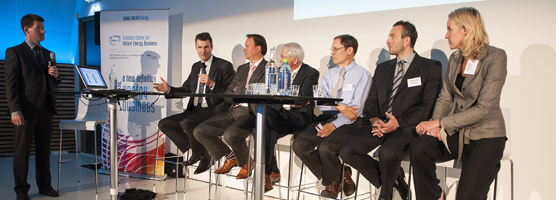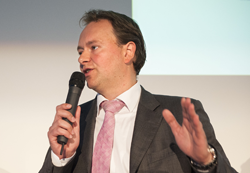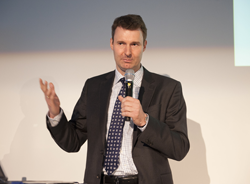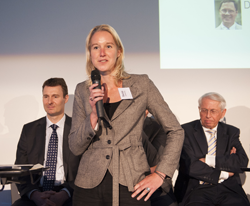Panel discussion

Stakeholder involvement and network orchestration
Dr Ketter asked how stakeholders are involved, and how the network can be co-ordinated.

Mr Van der Heijde, Head of the newly founded Smart Grid Division of Siemens in the Netherlands, noted that Rotterdam’s Alderman Alexandra van Huffelen focused on the prosumer, while German ambassador Dr Heinz-Peter Behr discussed the same topic from a macro perspective.
Pieter van Essen of the Port of Rotterdam explained that the port is overseeing a transition which takes the emphasis from ‘just cargo’ to ‘energy’, particularly as the Maasvlakte 2 project nears completion. As a centre for big companies and mega structures, Port customers and businesses need access to energy at low prices. The Port is also investing in renewable energy, for example in kite power.
Baukje Oostenbrug, Manager for New Energy at Essent RWE, said her company sees itself as an important stakeholder, and takes responsibility to make energy available, affordable, and sustainable. In particular, it is working on a bio-based economy, e-mobility infrastructure in Amsterdam, and energy management, which involves a simulation of 20 households in a smart grid. Essent is working with researchers to turn consumers into ‘smart consumers’.
Orchestration of the network
Dr Ketter noted that there are many stakeholders in the smart grid. He asked the panellists about their views on the orchestration of this network.
Erik Van der Heijden from Siemens said the development of a smart grid was not a goal but a means to make a sustainable future possible. Other steps include making efficiencies, investing in the network (‘putting copper in the ground’) to cope with peaks in demand and supply, and being clear about what economy of scale would make the plan feasible, he said.
Baukje Oostenbrug agreed, saying developing the technology is not the problem, and consumers must change. She gave examples of small business-to-business networks trading in energy consumption – especially in the Dutch horticulture sector.

Markus Bokelmann, Chief Financial Officer of E.ON Benelux said he didn’t think finding investors or producing new technology would be a problem. “In the future, the wrong decision will be NOT having a solar panel, but the problematic bit is the cost of the grid and back-up power,” he said. If customers become net producers, or become independent producers and disconnect themselves from the grid, there will be fewer people involved in the grid and the greater the problem of financing a grid that is little-used. Rebuilding and redesigning a grid to provide back-up power will be a challenge for policy-makers and regulators, he said.
Peter van Essen of the Port of Rotterdam predicted that solar power will gain parity with fossil power, and governments will miss the extra revenue, as will the grid operators, but if they should levy taxes on solar power, that would work against grid parity. “I wonder how the government will cope with that?” he said.
Erik Van der Heijden pointed out that ‘prosumers’ generating solar power could present a problem to the conventionally-designed grid; its cables are not designed as a two-way system. “Siemens is involved in a subsidy programme to cope with that, and we will need a smart device for it,” he said. “The demands we place on the grid are increasing. Who will be the owner of that problem?”
Opportunities of the smart grid
Dr Ketter asked the panel to identify opportunities related to development of a smart grid.

Baukje Oostenbrug said Essent was already working on developing smart services, such as an E-thermostat to control domestic heating; the system can be controlled from a distance using a smartphone app. “This is just a small first step,” she said. Essent is also developing a platform for more apps, including one for E-mobility, and the company sees the development of smart services as an opportunity to get out of the commodity trap by developing value-added services based on a smart grid and putting the customer in charge. Additionally, making the company’s value more transparent and appealing to customers is more complex and demanding for the supplier, but more interesting for customers.
Peter van Essen described the all-electric container terminal under construction in the Port of Rotterdam. The terminal will take electricity from the grid during off-peak hours and store it in batteries for use during peak hours. The issue of using clean electricity must be addressed so that customers are not punished by paying peak prices, he said, and it will be the role of the Port to stimulate the development of battery systems to a level where they can operate like this.
Returning to individual customers and small businesses, Dr John Collins argued that the smart grid holds the promise of providing customers with more information on their energy usage and prices so they can adapt their behaviour. But that might not be enough to adapt usage to availability and avoid ‘load curves’. A new level of automation might include electric vehicles, control of water heating, freezer, or laundry equipment integrated into the home energy mix and a whole range of opportunities – that are merely ‘glints in engineers’ eyes’ right now – could take smart energy usage to a whole new level, he said.
Dr Andreas Symeonidis advocated that companies should focus more on providing customers with more smart information for customers, and modelling their behaviour. Customers could also group together and negotiate price reductions.

